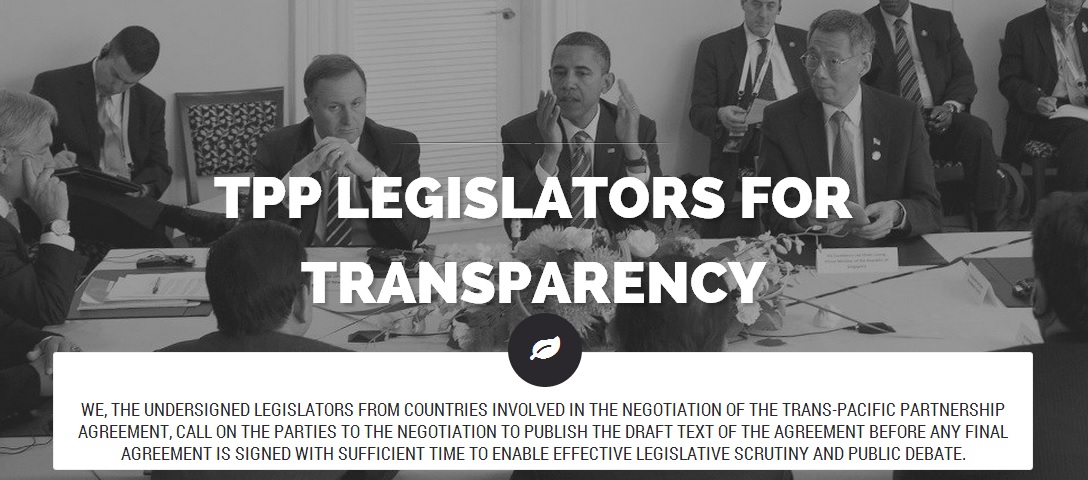Dozens of legislators from seven of the 12 countries negotiating the U.S.-led Trans-Pacific Partnership trade agreement took the unprecedented step this week of calling for the full TPP text to be released publicly before it is signed. The open letter reads simply:
We, the undersigned legislators from countries involved in the negotiation of the Trans-Pacific Partnership Agreement, call on the Parties to the negotiation to publish the draft text of the Agreement before any final agreement is signed with sufficient time to enable effective legislative scrutiny and public debate.
Jane Kelsey, a prominent New Zealand TPP critic and professor at the University of Auckland, said of the joint letter: “The trade ministers from the TPP parties have backed themselves into a corner with their extreme secrecy. That position is now untenable.”
The impressive showing of legislative opposition to TPP secrecy comes just 10 days before another secret round of negotiations is set to begin in Singapore (February 22-25) and days ahead of so-called intersessional meetings of TPP negotiators from February 17-21. One industry source told Inside U.S. Trade this week there are low expectations for the meetings but in January a Mexican trade official told the same publication the talks could wrap up by the end of April.
In Canada, the legislators’ letter was signed by Don Davies, the NDP international trade critic, and Green Party Leader Elizabeth May.
“The TPP covers issues that affect many areas of Canada’s economy and society — including several policy areas that have never been subject to trade agreements before,” said Davies of why he endorsed the letter. “In the interest of transparency and accountability, trade negotiation documents must be released to the public and in a meaningful way.”
The Conservative government of Stephen Harper has said almost nothing about the TPP publicly or to the media, and will not release a cost-benefit assessment of the deal to the parliamentary trade committee. Any criticism of the deal, or the similarly intrusive and secretive Canada-European Union Comprehensive Economic and Trade Agreement, has been dismissed without meaningful arguments as “anti-trade.”
The open letter followed approaches to senior politicians from Australia, Canada, Japan, Malaysia, Mexico, New Zealand and Peru who had expressed concern about the lack of transparency in the TPP negotiations. Other signatories include the Vice-President of Peru, the trade spokesperson for Australia’s Green Party, and several former Cabinet ministers from Japan.
But the letter is only the latest in a stream of calls by legislators in TPP countries for release of the texts over the past year. It also comes only a week after fair trade rallies were held in more than 50 communities across North America as part of an Intercontinental Day of Action Against the TPP and Corporate Globalization (see video). U.S. President Obama is feeling the heat even from within the Democratic party, which is not inclined to give him the “fast track” powers the administration feels it will need to pass the TPP with minimal delays in Congress.
As Kelsey explained, “The Australian Labor Party succeeded with a motion in the Senate last December calling for the text of the TPP and all other free trade agreements to be tabled in Parliament at least 14 days before they are signed. The Liberal government has refused.”
The New Zealand government also rejected a Labour Party motion asking:
That the House call on the New Zealand Government to publish the text of the Trans-Pacific Partnership Agreement before any final agreement is signed, with sufficient time to enable effective legislative scrutiny and public debate; either when it is made public by the United States Congress, or not less than 14 days prior to its signing in New Zealand; whichever is the earlier.
“Legislators from other countries have gone considerably further, demanding the release of the draft texts to allow them to do their job as legislators, open the process to expert analysis and democratic debate, and remove the reliance on leaked texts,” said Kelsey in her statement on the joint letter.
“In December, 34 deputies and 15 senators from Chile’s Parliament called on the President to halt the negotiations and make them transparent. Many belong to the party that will become the government in March… Members of the US Congress have issued a constant stream of letters objecting to the secrecy and seeking release of the draft texts.”
The letter and related documents can be found at www.tppmpsfortransparency.org, a website co-hosted by development agency Oxfam International and Article 19, an international NGO that campaigns for freedom of expression and transparency.
For more on The Council of Canadians’ campaign against the TPP, visit our website here.



